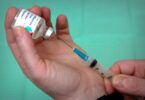Business Insider reports on more than a dozen recent studies that demonstrate the value of aerobic exercise for your gut, your memory, your immune system, your cardiovascular health, your strength, your stress level, your mood, your cholesterol levels and more. In short, aerobic exercise may be the best medicine for your body and your brain. It is also the least costly!
A study published in the journal Aging Cell reveals how a small group of serious bicyclists between the ages of 55 and 79 had more muscle mass, were stronger and had much younger immune systems than people their age who did little or no exercise.
The thymus gland produces T cells, which are critical for our immune systems. As we age, the thymus gland usually shrinks, beginning at age 20, and we produce fewer T cells. Yet, the researchers found that the bicyclists were producing higher levels of T cells than would be expected in older people, indeed as many as found in younger people.
A post on Harvard Health, “Regular exercise changes the brain to improve memory, thinking skills,” explains how researchers at the University of British Columbia, found that aerobic exercise that brings your heart rate up and gets you sweating seems to increase the size of the hippocampus. The hippocampus is the part of the brain that focuses on memory and learning.
A 44-year long observational study published in Neurology found that middle-aged Swedish women with good cardiovascular fitness were 88 percent less likely to develop dementia than women who were unfit.
Another study published in Exercise and Sports Sciences Reviews found that aerobic exercise may have as great benefits as weight training, when it comes to building muscle and strength.
A study published in the International Journal of Aquatic Research found that swimming and running, in particular, makes it easier for you to use oxygen efficiently, lowering your resting heart rate and breathing rate, and improving your heart health.
A study published in The Journal Physical Therapy Science explains that our moods improve through aerobic exercise because aerobic exercise lowers our stress hormone levels and increases overall blood flow in our bodies.
Yet another study, out of the Univeristy of Illinois, suggests that aerobic exercise may improve your gut, changing the composition of microbes and reducing the likelihood of inflammation, completely independent of diet.
And a meta-study of 13 studies that looked at the effect of aerobic exercise on people’s cholesterol levels found that aerobic exercise appears to reduce people’s LDL levels (bad cholesterol) and increase their HDL levels (good cholesterol).
Other studies demonstrate that aerobic exercise can reduce people’s risk of developing Type 2 diabetes significantly and help people with Type 2 diabetes manage their conditions by improving the way their bodies use blood sugar.
A study by Mark Tarnopolsky, McMaster University, found a link between aerobic exercise in people over 40 and healthy and more youthful skin.
A pilot study that looked at the short-term effects of aerobic exercise for 12 people, average age of 49, with moderate to severe major depression, found that walking on the treadmill for 30 minutes a day for 10 days reduced their symptoms, improving their mood.
Here’s more from Just Care:











If aerobic exercise is combined with a healthy diet,a clean environment and adequate income there is a big improvement in overall health